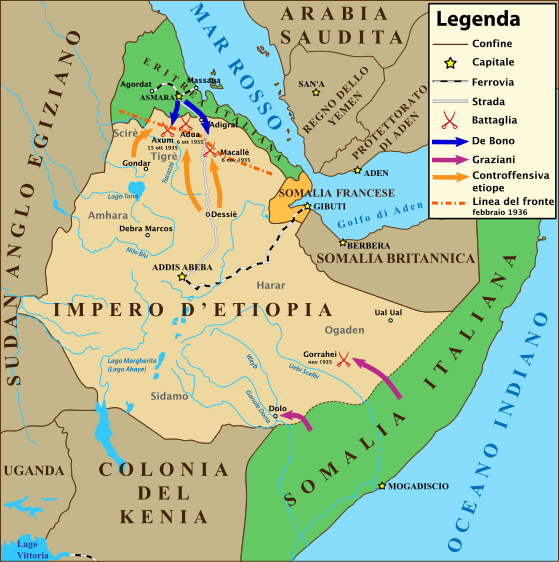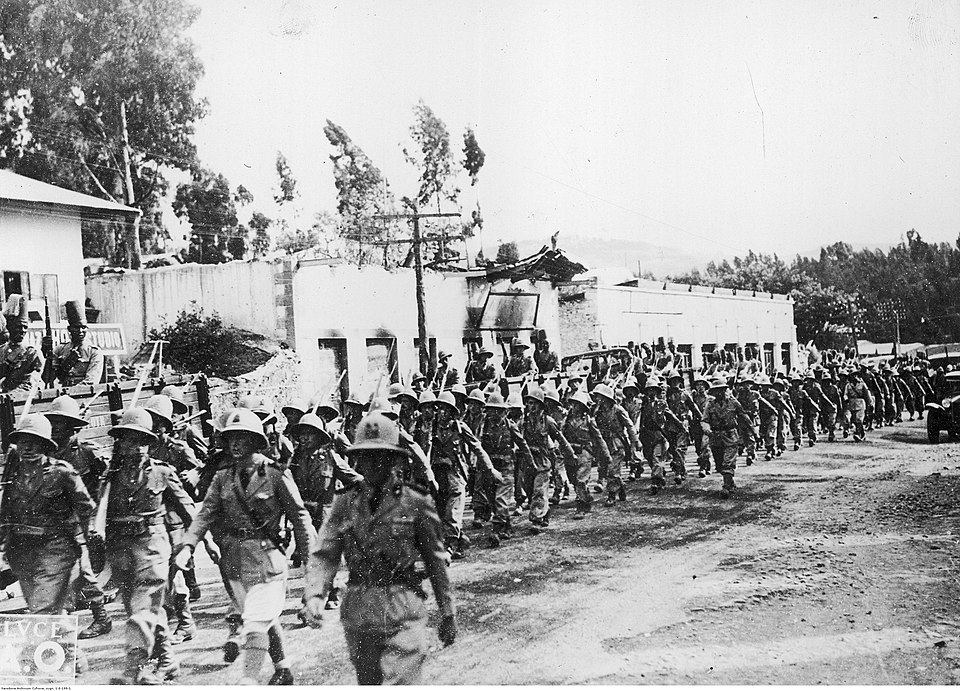IB Syllabus focus:
'Examine the Abyssinian Crisis (1934–1936) and the causes and consequences of the League of Nations’ failure to address Italian aggression.'
The Abyssinian Crisis was a definitive moment in the 20th century that exposed the fragility of international peace-keeping mechanisms. As the League of Nations grappled with the task of deterring Italian aggression against Abyssinia, the limitations of collective security became starkly apparent, casting a long shadow over the League's legacy and the prospect of maintaining peace in the tumultuous interwar period.
Historical Context: Abyssinia's Independence
Abyssinia, an ancient kingdom with a storied history, represented African sovereignty during a time dominated by European colonial powers.
Ethiopia stood out as a member of the League of Nations, showcasing its sovereign status amidst a continent carved up by foreign rule.
The nation’s membership in the League was emblematic of its commitment to international diplomacy and collective security. This commitment to diplomacy can be traced back to the broader Renaissance principles of statecraft and diplomacy, which underscored the importance of sovereign states engaging in international dialogue.
Precipitating Events: The Path to Confrontation
Italian Imperial Ambitions
Italy, spurred by Mussolini's fascist regime, was eager to expand its territorial holdings and erase the memory of past military embarrassments. This was part of a wider pattern of Italian expansion and aggression, which saw Italy seeking to establish itself as a dominant power in Europe and Africa.
Mussolini eyed Abyssinia as fertile ground for colonial expansion, seeking to bolster Italian prestige and secure economic gains. This ambition reflects the broader themes of nationalism and imperialism that were prevalent in Europe, influenced by earlier periods such as the impact of the French Revolution on European politics and the concept of nation-states.
The Walwal Incident: A Catalyst for War
In December 1934, a skirmish erupted at the Walwal oasis, located within a disputed border area between Abyssinia and Italian Somaliland.
This conflict was leveraged by Italy as a casus belli, justifying military intervention under the guise of a border dispute.
League of Nations' Response: A Test of Resolve
Immediate Reactions
The League was immediately called upon to mediate the escalating situation.
Abyssinia's plea for help placed the principle of collective security squarely at the forefront of international scrutiny.
Diplomatic Failure: The Ineffectiveness of the League
Sanctions and Their Shortcomings
Sanctions were levied against Italy, including a ban on arms sales, trade restrictions, and financial prohibitions.
These measures were hampered by lack of universal support, most notably the failure to embargo oil, a critical Italian war resource.
The Hoare-Laval Pact: Diplomacy Undermined
In an attempt at appeasement, British Foreign Secretary Samuel Hoare and French Premier Pierre Laval proposed giving Italy control over large swathes of Abyssinia. The exposure of this secret agreement led to a public outcry and the eventual resignation of Hoare. This event is a poignant reminder of the complexities of collective security and appeasement in the interwar period.
The exposure of this secret agreement led to a public outcry and the eventual resignation of Hoare.
Consequences of the League’s Actions
Abyssinia's Subjugation
Despite the League's efforts, Italian forces advanced, eventually capturing the capital, Addis Ababa, and proclaiming an empire.

Simplified campaign map of the Second Italo-Ethiopian War showing Italian advances from Eritrea and Italian Somaliland during 1935–early 1936. This visual clarifies the geography and pace of the offensive that overwhelmed Ethiopian defenses despite sanctions. Source
The League's failure to protect a member state was a stark indictment of its promise of collective security.

Italian troops parade in Addis Ababa after the city’s capture in May 1936, symbolizing the collapse of collective security in this case. The image connects the League’s limited sanctions and the Hoare–Laval fiasco to the concrete outcome on the ground. It reinforces how the crisis damaged the League’s authority and encouraged further expansionism. Source
The League's Credibility Damaged
The crisis dealt a severe blow to the League's standing as an instrument of peace.
The evident impotence of the League encouraged other nations, such as Germany, to pursue their expansionist aims with less fear of reprisal.
Wider Implications for Global Peace
The international community's reliance on the League's security guarantees was fundamentally shaken.
The The appeasement of Italy foreshadowed the later policy of concessions to Nazi Germany, illustrating the perils of compromising with aggressors, a historical echo of the Unification of Italy and the challenges of national consolidation in the face of external pressures.
IB History Tutor Tip: Assess the League of Nations' response to the Abyssinian Crisis to understand how international diplomacy's failure can escalate conflicts and undermine collective security frameworks.
Analysis of the League’s Structural Flaws
Procedural Inefficiencies
The requirement for unanimous consent among member states for action to be taken often led to crippling indecision.
The League lacked an independent military force, relying on the inconsistent will of its members to enforce its resolutions.
The Absence of Great Powers
The non-participation of the United States and the later exit of key powers like Germany weakened the League's international leverage.
The Concept of Collective Security Challenged
The crisis revealed that collective security was only as strong as the commitment of its member states.
The failure in Abyssinia demonstrated that the League’s mechanisms were insufficient when faced with aggressive powers.
Pedagogical Relevance for IB History Studies
A comprehensive study of the Abyssinian Crisis offers insights into the dynamics of international politics in the interwar period.
Students are encouraged to evaluate the effectiveness of international law and institutions in the context of power politics and real-world crises.
IB Tutor Advice: For essays on the League of Nations, highlight its structural weaknesses and the Abyssinian Crisis' impact on global politics to illustrate the challenges of international peacekeeping efforts.
By delving deep into the Abyssinian Crisis, IB History students gain a nuanced understanding of the complexities and limitations of interwar diplomacy. This episode stands as a cautionary tale of the catastrophic consequences when international bodies fail to act decisively against aggression. In learning about the League's inability to prevent Italy's conquest of Abyssinia, students can better appreciate the challenges of enforcing peace and the importance of robust, actionable international agreements. The crisis underscores the need for realistic appraisals of international commitments and the dangers of relying on moral authority without the means of enforcement, a lesson that remains relevant in contemporary global politics.
FAQ
Italy's international standing suffered significantly as a result of its aggression towards Abyssinia. The invasion was widely condemned by the international community, leading to Italy's isolation. While Italy did gain a colonial territory, the victory was hollow as it strained Italy's economy and military. Furthermore, the League of Nations' sanctions, albeit limited, signalled a moral victory for the concept of collective action against aggressors, despite the practical failure. The Abyssinian Crisis also pushed Italy closer to Nazi Germany, eventually becoming part of the Axis powers. This alignment during World War II would have far-reaching consequences for Italy's post-war position, with the nation emerging as a diminished power on the international stage.
The Abyssinian Crisis severely affected public opinion in Britain and France, causing a significant loss of faith in the League of Nations. The British and French publics were initially supportive of sanctions against Italy, viewing the League as a means of maintaining peace without resorting to war. However, the Hoare-Laval Pact's revelation and the subsequent failure of the League to protect Abyssinia from Italian aggression disillusioned many. This disillusionment was compounded by the widespread anti-war sentiment that remembered the horrors of World War I and favoured appeasement over confrontation. The crisis led to a realisation that the League lacked the teeth to enforce its resolutions, diminishing its credibility among the populations of its founding members.
Other European colonial powers viewed the Abyssinian Crisis with a mix of concern and self-interest. While publicly they adhered to the principles of the League and collective security, privately, many were reluctant to enforce action that might set a precedent against their own colonial interests. Countries like Belgium, Portugal, and Spain, which had significant colonial holdings, were wary of supporting strong actions against Italy that might one day be used as a justification against their own colonial policies. This contributed to the ineffectiveness of the League's sanctions, as these countries were not willing to take measures that could undermine their imperial ambitions or international standing.
Emperor Haile Selassie played a significant and symbolic role during the crisis. He personally addressed the League of Nations' Assembly in June 1936, making a poignant appeal for assistance and drawing attention to the League's obligations under the principle of collective security. His speech was a powerful indictment of the League's failure to act and an eloquent plea for the principle of sovereign integrity. Selassie's presence underscored the human cost of the League's inaction and highlighted the Emperor's own standing as a symbol of resistance against colonial aggression. However, despite his efforts, the League's response remained ineffectual.
The League of Nations hesitated to close the Suez Canal to Italian shipping because of the complex international implications such an action would have entailed. The Suez Canal was controlled by British and French interests, and both countries were keen to avoid a direct confrontation with Italy for fear of driving Mussolini to ally more closely with Hitler's Germany. Moreover, there were legal concerns about the neutrality of the Canal and the potential for setting a precedent that could affect future international navigation rights. Closing the canal might have escalated the conflict to a broader European war, which the British and French governments, still weary from World War I, were anxious to avoid.
Practice Questions
The League's sanctions against Italy were largely ineffective. They failed to include oil, a vital resource for Italy's war machine, rendering them insufficient to deter Italian aggression. An excellent IB History student would argue that while sanctions represented the League's commitment to collective security, their implementation was half-hearted, highlighting member states' reluctance to fully confront Mussolini. The sanctions did cause some economic strain, but they were undermined by the United States’ refusal to participate and the League's failure to assert military pressure, which allowed Italy to continue its campaign, ultimately leading to the subjugation of Abyssinia.
The Abyssinian Crisis significantly undermined the concept of collective security as championed by the League of Nations. It exposed the weakness of relying on moral authority without the backing of force. The League's failure to prevent Italian annexation of Abyssinia illustrated the futility of collective security when major powers are either absent or unwilling to enforce it. This crisis emboldened other aggressive states by illustrating the League's impotence, setting a precedent that contributed to the onset of World War II. An outstanding IB History response would link these failures to the eventual establishment of the United Nations, which sought to rectify these deficiencies in international peacekeeping.

